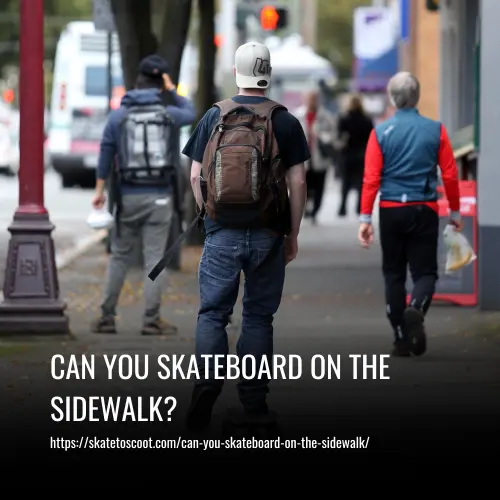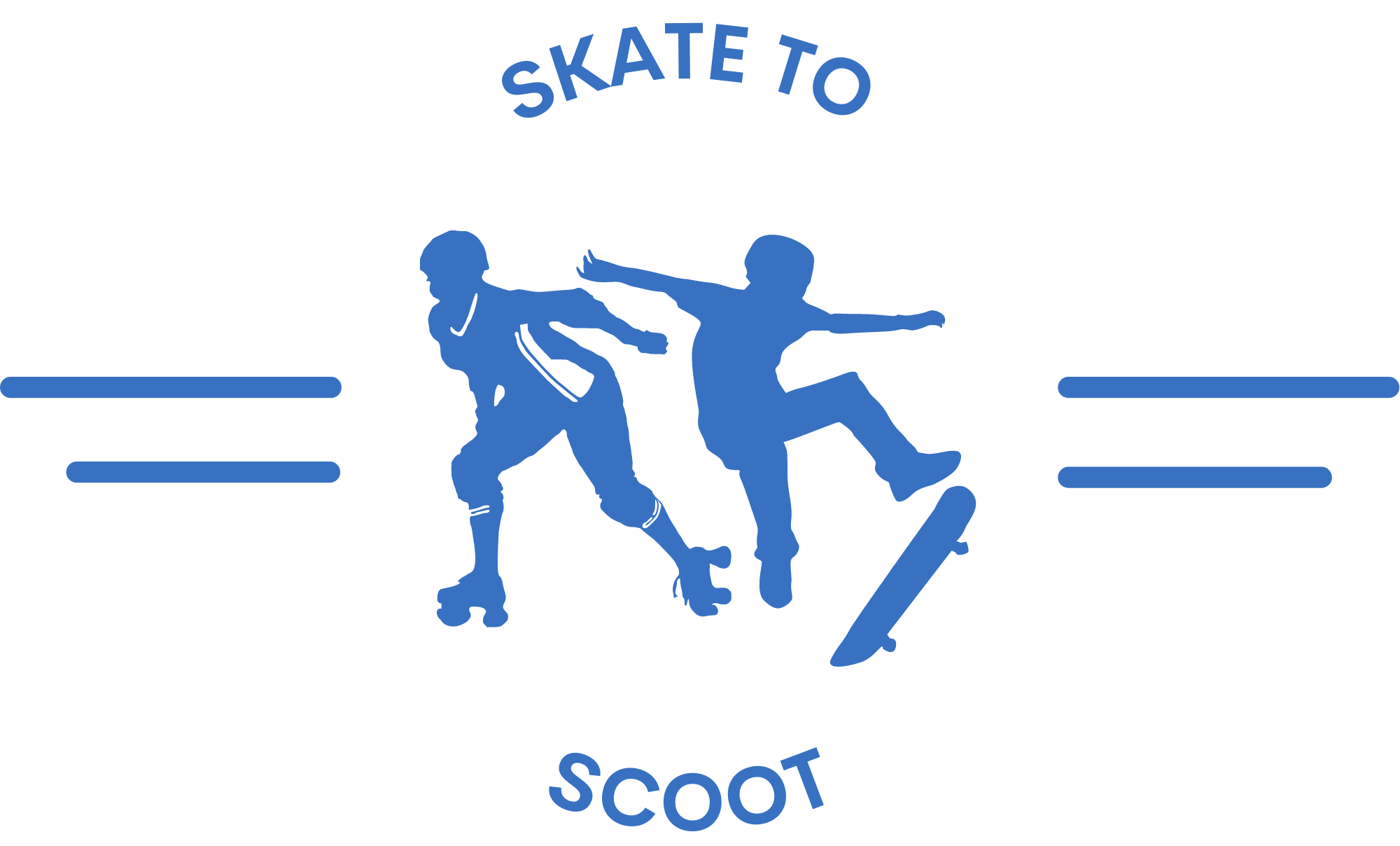Can You Skateboard On The Sidewalk? What You Need to Know
As an Amazon Associate we earn from qualifying purchases.
In most US states, you are allowed to ride your skateboard on the sidewalk, just as you would be labeled a pedestrian. This means that your rights and obligations are similar to those of pedestrians – so no special license is necessary. Unless posted otherwise, skateboarding on the sidewalk should generally be viewed as legal.
However, it’s important to always consider safety when skateboarding – pay attention to other people or vehicles nearby, make sure that you know where it’s acceptable to skateboard (check local laws or signage regarding any restrictions) and wear a helmet if possible.
While walking with your board is usually encouraged when sidewalks are crowded or there are lots of pedestrians around, it’s important to bear in mind that ultimately you may be held responsible in certain circumstances for being careful and taking due caution.

Can You Skateboard On The Sidewalk Of Private Property
The simple answer to the question of whether you can skateboard on the sidewalk of private property is: it depends. Private property owners have the right to forbid skateboarding on their premises, including any sidewalks that are within their limits. That being said, there are certain risks involved if you do decide to skateboard on someone else’s property.
First off, if you do injure yourself while skateboarding on private property, it will be your own fault as skateboarding is listed as a hazardous recreational activity. Secondly, the owner of the property cannot take away your board or physically assault you for refusing to vacate their property. In this case, they must call the police who may escort you home or ask for you to leave.
All in all, if you plan on skateboarding on someone’s private sidewalk, it is important to be aware of the risks and consequences that may come with it.
Remember To Yield To Pedestrians
Skateboarding is not illegal, but skating without a helmet is. So be sure to wear one any time you are on the sidewalk or out on the roadway! While skateboarding in public places isn’t against the law, pedestrians must be given the right of way and should always have priority. Don’t forget that when you come across pedestrians (or skaters like yourself) – yield to them and make sure they cross safely!
When there are no sidewalks around, skateboarders should travel in the left lane of the road while facing traffic and move off the roadway when cars approach. By following this protocol, you can ensure that both yourself and those around you stay safe! Remember to yield to pedestrians – it’s good practice for both legal and safety purposes.
Can You Get Arrested For Skating On The Sidewalk
Can you get arrested for skating on the sidewalk? The simple answer is no. Skateboarding itself is not illegal, though skaters must abide by local and state laws when skating on public or private property. In other words, property owners and police can ask skaters to leave their premises or stop skating in certain areas, but they cannot arrest them without cause.
That being said, skaters can be arrested if they provoke the authorities or damage property. This might occur if a skateboarder refuses to listen to officials, damages private or public property (such as graffiti), or engages in aggressive behavior such as assault or battery. In rare cases, theft and vandalism can also be considered causes for arrest regardless of skateboard use.
Skateboarders should take caution when skating on sidewalks and stay aware of their surroundings so that they do not put themselves in an illegal situation. It’s important to remember that skateboarding is a hazardous activity and that skaters cannot seek legal action against a property owner should an injury occur due to their own negligence.
Skateboarding Laws
Skateboarding laws are important for the safety of skateboarders and pedestrians alike. Generally, skateboarders are allowed on the sidewalk, as long as they yield to other pedestrians. It’s always important to be aware of warning signs and local bylaws since there might be specific rules regarding skateboarding in certain areas.
No special license is needed if you want to follow state laws and regulations while skateboarding, but laws vary in different states, and some only allow 12 years old teens and above to ride skates in public places.
If there is no sidewalk available, it’s recommended that you ride your board on the left side of the road and face traffic for your own protection. Also keep in mind that it is illegal to skate without wearing a helmet – if you find yourself guilty of violating this law, you will be fined accordingly.
Other laws include trespassing and vandalizing which will lead to consequences with the authorities if violated. It’s best to always be mindful when using a skateboard and make sure you follow all laws and restrictions so you can enjoy skating safely.
Can I Legally Ride Skateboard On The Sidewalk
Skateboarding is legal throughout most US states and cities, so you can safely ride your skateboard on the sidewalk without needing a special license. You’re treated as a pedestrian, with all the same rights and responsibilities as any other pedestrian – that means you should yield to other pedestrians and never run into them!
It is important to be aware of the laws and regulations set by your local municipality, as they may vary in busier areas. They often will have specific areas where skateboarding is not allowed, so it pays to be aware of what those places are.
Though it’s possible to ride on the sidewalk, it often can be more work than it’s worth. Breaks in concrete slabs and uprooted sidewalks make it difficult and uncomfortable to skateboard, which is why many skaters prefer to take their boards into the street when it’s safe to do so.
Is It Legal To Ride You Skateboard On The Street
Is it legal to ride your skateboard on the street? The answer is, it depends. Foot scooters, skateboards, and rollerblades may be ridden on footpaths unless there are specific signs that prohibit them, but riders must always stay to the left and give way to other pedestrians.
However, powered foot scooters or skateboards cannot be registered for use on public streets. Generally, they can only be used on private property. That said, laws will vary from state to state or city to city so make sure you check the local laws before attempting to take your board out for a spin.
Tips For Skateboarding On The Sidewalk
If you’re looking for a little help with skateboarding on the sidewalk, then you have come to the right place. Skateboarding can be a bit of a puzzle sometimes – especially when it comes to navigating sidewalk cracks. Fortunately, there are some useful tricks and tips that can help you out.
For instance, try lifting up your front wheels with the tail when you’re about to approach a crack or obstacle. You may even want to shift your weight onto your back wheels if needed. Doing both of these things will allow you to cruise over any surface without stopping short.
It is also important to keep your eyes focused on what’s ahead rather than constantly looking down at your feet while skating. And last but not least, always use protective gear such as helmets and pads no matter how experienced of a skateboarder you are – falling is inevitable so safety should never be compromised!
FAQs
Most states forbid road riding with motorized or non-motorized vehicles, though skateboarding on sidewalks is still allowed. Everyone must obey such regulations since most cities levy fines for breaking them.
It depends entirely on the proprietors of the parking lot. Generally, they will prohibit such riding due to plentiful cars. Furthermore, you might go unnoticed regarding the arrival or departure of vehicles. You could cause issues for yourself and auto owners alike.
Such activity can often lead to personal injury or damage to the health of others. Therefore, high-speed, performing tricks should be avoided at all costs. For instance, in Texas, riders are only permitted to utilize public places to cross intersections with pedestrians.
Conclusion
Skateboarding can be a great way to stay active, have fun and even travel, but it is important to follow local regulations for riding on sidewalks. While some jurisdictions allow skateboarding on sidewalks as long as the rider is careful and follows traffic laws, others forbid it altogether.
Before skating, make sure you know your rights and responsibilities so that both you and the pedestrians around you remain safe.
